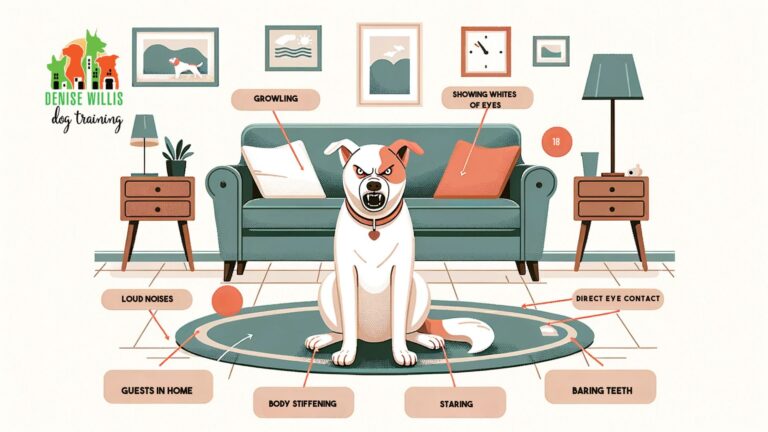Why Dog Train?
That’s an easy question to answer! You brought a dog into your life to have a companion. Dog training gets your companion to stop being a jerk when people come over or scaring others on your daily walk, or any of the other things that make a life, for the most part, enjoyable except for those few areas that you grit your teeth and mentally prepare yourself for the apologies you’re going to make or the embarrassment, stress, and anxiety you’re going to feel.
And while it’s easy to understand our feelings on these issues, it’s not so easy to understand why our dogs are doing what they are doing and find a solution that works without micromanaging all the time. That’s where we need to get in between their ears. Training is creating a bridge of communication, a vocabulary beyond the usual sit, down, stay, etc. It’s getting your dog to THINK proactively instead of reactively. To make a decision on his own that benefits both of you. Dogs are not generally trying to be jerks. Like most animals (including us), they are doing what feels right to them, even the things that seem dangerous or counterproductive. Teaching from a dog’s perspective is not natural for many owners. Training allows you, the owner, to get a dog’s eye view and teach your dog to see things from your side. That experience strengthens the bond because as you both grow together, there is mutual understanding, a 2-way street of communication.
What are the Benefits of Training Dogs?
Training your dog not only makes for a better-behaved pet, it also builds trust and respect between you and your dog. A well-trained dog is safer to have around other people and pets since they are less likely to act out of fear or aggression. Training also provides the physical and mental stimulation that helps keep them mentally and physically healthy. Training also helps keep your dog from developing boredom-related behaviors such as barking, destructive chewing, and digging. Training also provides an outlet for bonding together. It allows you to spend time with your dog and have fun while building a solid relationship between you and your pup. Finally, training can be used to teach valuable life skills such as coming when called, walking on a leash, and potty training. All of these things can make living with a dog more enjoyable for both the pet and the owner.
In short, training is beneficial for all involved! It gives your pup an outlet to express itself, reduces stress levels in the household, reinforces essential life skills that support safety, provides mental and physical stimulation, and strengthens the bond between you and your pup. Whether it’s basic obedience training or teaching more complex tasks like agility, training provides a way for you to communicate with your dog in a language that both can understand. Ultimately, it helps ensure that everyone gets along better!
Why Consistency Is Key in Effective Dog Training
Consistency is key when it comes to training your dog. Dogs learn best with repetition and reinforcement, so if you want your pup to remember a command or behavior you’ve taught them, it’s essential to be consistent when giving the commands and reinforcing their learning. The more consistent you are in teaching a particular behavior, the faster your dog will learn, and the better they’ll remember it.
Consistency is also important when it comes to training because dogs rely on routine and structure. In order for a dog to be successful in their training, they need to have expectations and rules set by you that they can consistently refer back to. This helps them understand what is expected of them and keeps them from becoming frustrated or confused.
Finally, consistency is important for building trust and respect between you and your dog. Dogs are more likely to follow commands if they know that the same action will always have the same result. This helps build a sense of security in the dog as they trust that you will always be consistent in your commands and expectations.
Overall, consistency is key to effective dog training. If you want your pup to learn quickly and remember what they’ve learned, it’s essential to remain consistent when teaching them new behaviors and to reinforce the ones they already know. This helps them become well-mannered, well-behaved dogs that you can be proud of!
What Are the Benefits of Training Your Dog?
Training your dog brings many benefits, both to you and your pup. First, it helps build the relationship between you and your dog by strengthening the bond of trust. Training also makes for a better-behaved pet since it teaches them good manners and important life skills such as coming when called, walking on a leash, and potty training. Training also helps reduce stress in the household and provides a great way to bond together as you spend time with your pup, having fun while reinforcing important life skills. Finally, it keeps your dog mentally and physically stimulated, helping them stay sharp and active.
Training your dog can have many positive benefits for both you and your pup. It helps strengthen the trust between you and your dog and teaches them important life skills. Training also reduces stress in the home, provides mental stimulation, and gives you a great way to bond together while having fun. Ultimately, it helps your dog become a well-mannered, happy pup that you can be proud of!
By investing the time and effort into training your pup, you’ll be sure to reap the rewards. Training is beneficial for all involved and helps ensure everyone gets along better! With patience and consistency, you can teach your pup various essential life skills that will last their lifetime.
Understanding Why Some Dogs Don’t Respond to Traditional Training Methods
Many dog owners have experienced the frustration of having their pets ignore commands or fail to follow directions. While it is easy to blame the pet for being uncooperative, deeper issues should be addressed before giving up on training. A better approach is first to understand why a dog might not respond to traditional methods of training and then develop strategies to address the underlying issues.
The first step in understanding why a dog may not respond to traditional methods is to consider their individual personality and traits. Some dogs are naturally more independent or stubborn, which can make them less receptive to commands. Other breeds may also have specific needs that require additional attention and care regarding training. For example, hunting breeds such as retrievers and pointers may have a strong instinct to chase or follow scents, making it difficult for them to focus on commands.
It is also essential to consider the environment in which the training occurs. Dogs often respond better when taught in familiar settings with minimal distractions. If too many people, noises, or other stimuli are present in a training session, it can be difficult for the dog to focus and understand the commands. Additionally, if the trainer is not providing consistent reinforcement or rewards for good behavior, then it can be difficult for the dog to associate behaviors with positive outcomes.
Finally, some dogs may have experienced trauma or abuse that has caused them to become fearful or anxious. This can make it difficult for them to process commands and trust the trainer, which can lead to resistance to training. In such cases, it is vital to work with a qualified animal behaviorist who can assess the dog’s specific needs and develop a treatment plan that addresses any underlying issues before traditional training methods are attempted.
By understanding why a dog may not respond to traditional training methods, owners can develop strategies and plans that will help them successfully train their pets. With patience, consistency, and the right approach, any pet can learn to obey commands and follow directions.
Advantages of Hiring a Professional Trainer for your Dog
Hiring a professional dog trainer can be beneficial for several reasons. A professional trainer has the expertise and experience to help dogs with behavioral issues, such as aggression, anxiety, or fear. They also have specialized knowledge about training techniques and methods that can help your pet learn quickly and effectively.
Professional trainers can also identify underlying issues that may be causing your dog’s problem behaviors and can develop an individualized plan for addressing them. This is important to ensure that the training process is effective and long-term.
By working with a professional trainer, you will also benefit from the accountability factor – if your pup isn’t making progress, the trainer can help you troubleshoot and make corrections. This can help ensure that your dog gets the best possible training experience.
Finally, a professional trainer can provide valuable insight into properly caring for your pet. They are knowledgeable about health, nutrition, and exercise routines which can benefit your pup’s overall well-being.
Hiring a professional dog trainer can be crucial in developing a trusting, happy relationship between you and your pet. With the right training plan and guidance from an experienced pro, you’ll be able to create the right environment for your pup to thrive in.


How to Know If Professional Dog Training is Right for You and Your Dog
Before embarking on a professional dog training journey, some crucial factors must be considered. First and foremost, your pup should be healthy and active to benefit from the experience. If your pet has special needs or health issues, it’s best to consult with a veterinarian before engaging with a trainer.
It would be best to consider how much time you are willing to commit to the training. Professional dog training requires a commitment of both time and energy on your part and that of your pup. The training may not be as successful if you cannot commit a certain amount of time or energy.
The type of training that is right for you and your pup is also an important factor to consider. Not all trainers offer the same services, so it’s important to research and find one with experience with the type of training you are looking for. Additionally, ensure the trainer has been certified and accredited by industry organizations such as the Association of Professional Dog Trainers or Certified Pet Dog Trainers.
Ultimately, deciding whether or not professional dog training is right for you and your pup is a personal decision. Consider all of the factors involved, including your own lifestyle and your pet’s needs, before committing to any particular training program. With the right trainer and the necessary commitment on both ends, professional dog training can be an invaluable experience that will benefit both you and your pup for years to come.
Understanding Your Dog’s Behavior and Responding Appropriately
Getting professional dog training can also help you learn more about your pup’s behavior and how to respond appropriately. While it can be difficult for even the most well-meaning pet parent to figure out what their pup is trying to communicate, a professional trainer can teach you how to interpret different behaviors and body language so that you can better understand your pup’s needs.
Training can also help your dog learn appropriate behaviors when it comes to things like greeting guests, playing with other dogs, and interacting in public places. Training is an excellent way to establish a bond between you and your pup and deepen the trust between the two of you. Consistent training and positive reinforcement will help your pup respond favorably to certain commands, signals, and situations.
Meeting with a professional trainer can also be helpful for difficult-to-treat behavior issues like aggression or separation anxiety. Professional trainers can provide valuable insight into how to modify problematic behaviors and create an environment in which your pup feels safe and secure.
No matter what kind of dog you have, understanding their behavior and responding appropriately will help you build a strong relationship with your pup that’s based on trust and respect. If you need extra help, don’t hesitate to contact a professional trainer who can provide the guidance needed to ensure your pup is happy and healthy.
Recognizing When Professional Help is Needed with Your Dog’s Behavior
Sometimes, more is needed to learn more about dog behavior and respond appropriately. Suppose your pup is displaying repetitive destructive or aggressive behaviors, seeming to suffer from depression or anxiety, or responding negatively when you attempt to discipline them. In that case, professional help may be necessary to address the deeper issues underlying these behaviors. An experienced trainer can help you understand why your pup behaves the way they do and develop an appropriate behavior modification plan.
By understanding the behaviors underlying their misbehavior, you can help your pup learn how to respond more appropriately and form a stronger bond with you. A qualified professional can offer guidance on how to use positive reinforcement methods such as clicker training or operant conditioning to encourage desirable behaviors while discouraging unwanted ones. Additionally, they may recommend special techniques, such as desensitization exercises, which can help your pup become less fearful or anxious in stressful situations.
If your dog’s behavior is too difficult for you to manage on your own or their problem behaviors significantly impact their quality of life, consider consulting with a professional trainer or animal behavior specialist. With professional guidance and patience, you and your pup can work together to build a healthy, rewarding relationship.
So… Why Dog Training?
As with anything worthwhile, there is work involved. My goal is to have you and your dog be able to face the everyday occurrences that are so natural to us but maybe not so natural for our dogs. Having your dog as your partner and progressing forward makes the journey worth much more. So why dog training? Simply put, it’s to teach your friend HOW to be your friend from both ends of the leash. It’s to give your dog the tools to be able to understand you and for you to understand them. Together, this creates an invaluable bond that will last a lifetime.
Dog training is not a one-size-fits-all approach. Depending on your goals, lifestyle, and breed of your pup – the methods vary drastically. The foundation of dog training is based on understanding and communication. With the use of tools, proper techniques, and correct timing – together, we can create a bond with our pup that will last us a lifetime. Dog Training is beneficial for any age, breed, or lifestyle! It gives your pup an outlet to express themselves by teaching them proper behaviors that lead to successful outcomes.
The most important thing to remember when dog training is consistency and patience… your pup won’t learn overnight! It will take a lot of practice, continual reinforcement, and positive rewards – but I promise you that it will be worth the effort in the end. With proper guidance, love, and understanding – you can create a bond like no other! So don’t let fear or lack of knowledge stop you from giving your pup a better life. Get started today and contact me for more information on how I can help you and your pup reach your training goals! Let’s start the journey together – one paw at a time.







